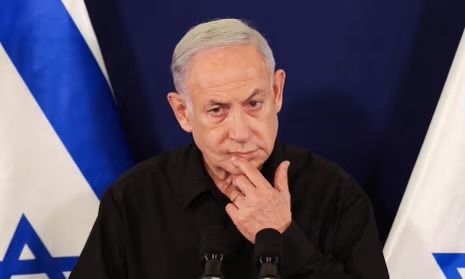
Frustration is mounting in Israel over Prime Minister Benjamin Netanyahu’s handling of the war against Hamas and his growing rift with President Biden. These public tensions are raising concerns about increased attacks from Iran and its proxies across the region.
Israeli Defense Minister Yoav Gallant has become the most senior official to publicly challenge Netanyahu. Gallant demanded that Netanyahu outline a post-war plan for Gaza after Hamas is defeated. “I call on Prime Minister Benjamin Netanyahu to make a decision and declare that Israel will not establish civilian control over the Gaza Strip, that Israel will not establish military governance in the Gaza Strip, and that a governing alternative to Hamas in the Gaza Strip will be raised immediately,” Gallant said in unusually blunt remarks during Israel’s Memorial Day commemoration on Wednesday.
This marks the second time Gallant has directly challenged Netanyahu, the first being in March 2023 when he warned that Netanyahu’s controversial judicial reforms threatened national security. Analysts suggest that the internal division at that time may have influenced Hamas’s decision to launch its massive attack on October 7.
Gallant’s recent comments came as five Israeli soldiers were killed in friendly fire amid renewed military operations in northern Gaza against a reconstituted Hamas. Gallant also highlighted the need for Israel’s military to focus on the escalating conflict with Iran-backed Hezbollah in Lebanon, which has displaced an estimated 60,000 Israelis from northern communities.
“Israel can’t handle staying in Gaza; it’s a lot of effort, a lot of money, a lot of death and casualties,” said Neomi Neumann, a visiting fellow at the Washington Institute for Near East Policy and former head of the research unit at the Israel Security Agency (Shin Bet). “We don’t have a good solution, but to stay in the Gaza Strip is among the worst options. We also have another war in the north, so we need to focus there, where the danger is much higher,” Neumann added.
Gallant’s remarks reflect frustration in Washington that Netanyahu is avoiding tough decisions to end the war against Hamas. A senior administration official expressed concern to The Hill: “We share the Defense Minister’s concern that Israel has not developed any plans for holding and governing territory the IDF clears, thereby allowing Hamas to regenerate in those areas. Our objective is to see Hamas defeated.”
Representative Gregory Meeks (D-N.Y.), ranking member of the House Foreign Affairs Committee, commented on Netanyahu’s defiance regarding demands from President Biden, particularly to halt a major military operation in Rafah, southern Gaza. Representative Brad Sherman (D-Ill.), a senior member of the Foreign Affairs panel, criticized Netanyahu’s stance, saying, “If Netanyahu’s plan is permanent occupation of Gaza, that’s a worse plan than I’ve heard from anyone else.” Senator Richard Blumenthal (D-Conn.) also warned against Netanyahu becoming an obstacle to U.S. interests in the region.
Secretary of State Antony Blinken, in a recent interview with CBS’s “Face the Nation,” criticized Israel for not engaging in planning with the U.S. and Arab countries for Gaza’s future after Hamas’s defeat. Blinken emphasized that the U.S. shares Israel’s objective of preventing Hamas from governing Gaza again and ensuring the territory’s demilitarization. However, he advocated for a different, more effective approach.
The Biden administration is pursuing a grand strategy that includes establishing a post-Hamas governing authority in Gaza as part of a larger deal to normalize relations between Israel and Saudi Arabia. This strategy includes a cease-fire to allow for the release of over 130 hostages held in Gaza since October 7. The administration hopes a weeks-long cease-fire will enable Gulf and Arab countries to participate in negotiations for Gaza’s stabilization without Hamas.
Saudi Arabia has expressed interest in deeper ties with Israel but insists on recognizing the Jewish state only with a clear pathway to a Palestinian state. National security advisor Jake Sullivan is visiting Saudi Arabia and Israel to continue talks on the mega-deal and address U.S. concerns about Israel’s military operations in Rafah. Last week, President Biden took the unprecedented step of holding back a shipment of heavy bombs to Israel due to concerns about the humanitarian impact.
Sullivan emphasized the need to consider Gaza’s tactical situation in the context of the broader strategic picture. “Israel’s long-term security depends on being integrated into the region and enjoying normal relations with Arab states, including Saudi Arabia,” he stated.
Biden is balancing strong support for Israel’s security needs with domestic backlash over the high Palestinian civilian death toll and humanitarian crisis in Gaza. While he has withheld certain weapons shipments to limit civilian casualties, Biden proposed a $1 billion arms sale to Israel for its long-term security needs. Representative Meeks, who can influence the sale, highlighted the challenges of making decisions that impact human lives.
The U.S. remains highly aware of the threats from Iran and its proxies, including Hezbollah in Lebanon and the Houthis in Yemen. The U.S. led an international coalition to defend Israel from an unprecedented Iranian attack in April, with cooperation from Jordan, France, the UK, Saudi Arabia, and other Arab countries. However, the success of such coordinated defense efforts is not guaranteed if U.S.-Israel relations strain further.
Robert Satloff, executive director of the Washington Institute for Near East Policy, stressed the importance of an agreed-upon post-war plan for Gaza, requiring leadership, vision, and diplomacy. Failure to achieve this could consign both Gaza’s people and Israeli soldiers to endless conflict.
Gallant underscored the importance of U.S.-Israel ties despite disagreements. “There are some disagreements, yet I emphasize – in this war too, the United States was the first to stand by us, in actions, not just in words, and the U.S. continues to stand by us now,” he said, advocating for resolving disagreements privately rather than through public statements.
Leave a Reply Cancel reply